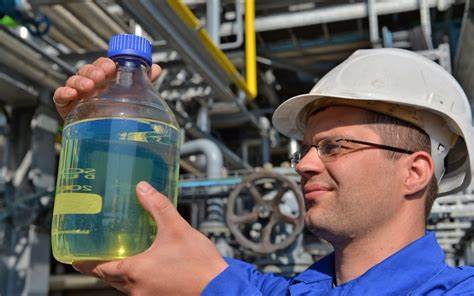Invented over a century ago, synthetic fuels They have been resurrected in the heat of the ecological transition to try to decarbonise sectors that are difficult to electrify such as maritime transport or aviation. But in recent times this technology has also risen in the automotive debate thanks to Germany, which proposes synthetic fuels as a lifeline for cars with combustion engines.
Berlin has blocked the EU star regulation to veto the sale of cars that emit CO2 from 2035, without going into the type of motorization. Germany demands more explicit projection to synthetic fuels or “e-fuels” and not only to the electric motor.
Can read: Police detain man who took hostages in pharmacy in southern Germany
WHAT ARE THEY?
An artificial product similar to fossil fuels but in principle neutral in CO2 emissions because they release only the carbon dioxide previously used to produce them, although they do emit nitrogen oxides or particles.
THEY ARE NEW?
They are based on a method patented in 1913 by the German Nobel Prize in Chemistry Friedrich Bergius, whose production started in 1919 using bituminous coal. They were of some importance to Germany in the Second World War but “they did not achieve the expected success” and around 1939 Adolf Hitler produced “only 18% of the synthetic oil he needed for the war”, says the historian Álvaro Lozano in his book “Nazi Germany”.
“It made it possible to offer an alternative to oil, a resource for which Germany barely had its own reserves (unlike what happened with coal). In this way, the Nazi war machine was able to operate for nearly six years, circumventing the limits imposed by geography,” explains contemporary history expert Manuel de Moya Martínez to EFE.
They continued to be researched and manufactured in different countries in subsequent decades without their production ever taking off, until they have regained prominence with the transition towards a CO2-free economy.
HOW ARE THEY MADE?
As raw materials, water and carbon are needed. Through electrolysis and using a large amount of electricity breaks down water (H2O) into “green” hydrogen and oxygen, while carbon can be obtained by capturing CO2 that has already been emitted or by recovering it from biomass.
An oxygen atom must be removed from that molecule to obtain carbon monoxide (CO). Later, this is associated with hydrogen and a molecular structure similar to that of crude oil is achieved, which is then refined to obtain a fuel suitable for a combustion engine.
THEY ARE EXPENSIVE?
A priori yes, but it is not known exactly because there are currently only 18 factories in the world, including the experimental ones, according to the Alliance for Efuels. It’s hard to put a price on them.
According to some studies, they cost ten times more than gasoline, while others indicate that they could drop to 4 or even 2.3 euros per liter by 2030. “They are not produced on a scale. Prototypes can be found but today you cannot buy gasoline and synthetic diesel,” he explained to EFE. Yoann Gimbertanalyst at the Transport and Environment think tank.
In addition, there are many types of synthetic fuels that differ in their preparation and use, depending on whether you want to produce e-oil, e-diesel, e-gas or e-kerosoene. European legislation plans to gradually introduce them in sectors such as aviation or maritime transport, since it is difficult to move heavy vehicles with an electric motor.
“They should be prioritized (…) where there is no alternative,” adds Gimbert.
DO THEY WORK FOR CARS?
They could be used in a current combustion engine. But technological development indicates that they would be so expensive that they could not compete commercially with the electric motor or other clean technologies such as hydrogen cells.
However, the car manufacturer Porsche, a subsidiary of the German group Volkswagen, plans to install a synthetic fuel pilot plant in Punta Arenas (Chile) and then scale up production in Australia and the United States. “Using a car with ‘e-fuels’ would cost about 10,000 euros more than an electric one in five years (…). It can be understood why Porsche does it”, says Gimbert about that luxury car manufacturer, who adds that “the oil and gas industry also has great interest in synthetic fuels”.
ADVANTAGES AND DISADVANTAGES
It works in their favor that they are neutral in emissions, they have more energy density than the electric motor, they do not require rare earths and they would make it possible to maintain the automotive infrastructure of gas stations in use. But their production is expensive and complex, they require the consumption of a large amount of electricity and a lot of energy is lost in the process.
“Establishing long-term strategies based on the internal combustion engine will cost us much more than money; it will cost us urgently needed time to roll out electric vehicles and charging infrastructure if we are to have any chance of containing the climate crisis. NGO International Council for Clean Transportation.

















